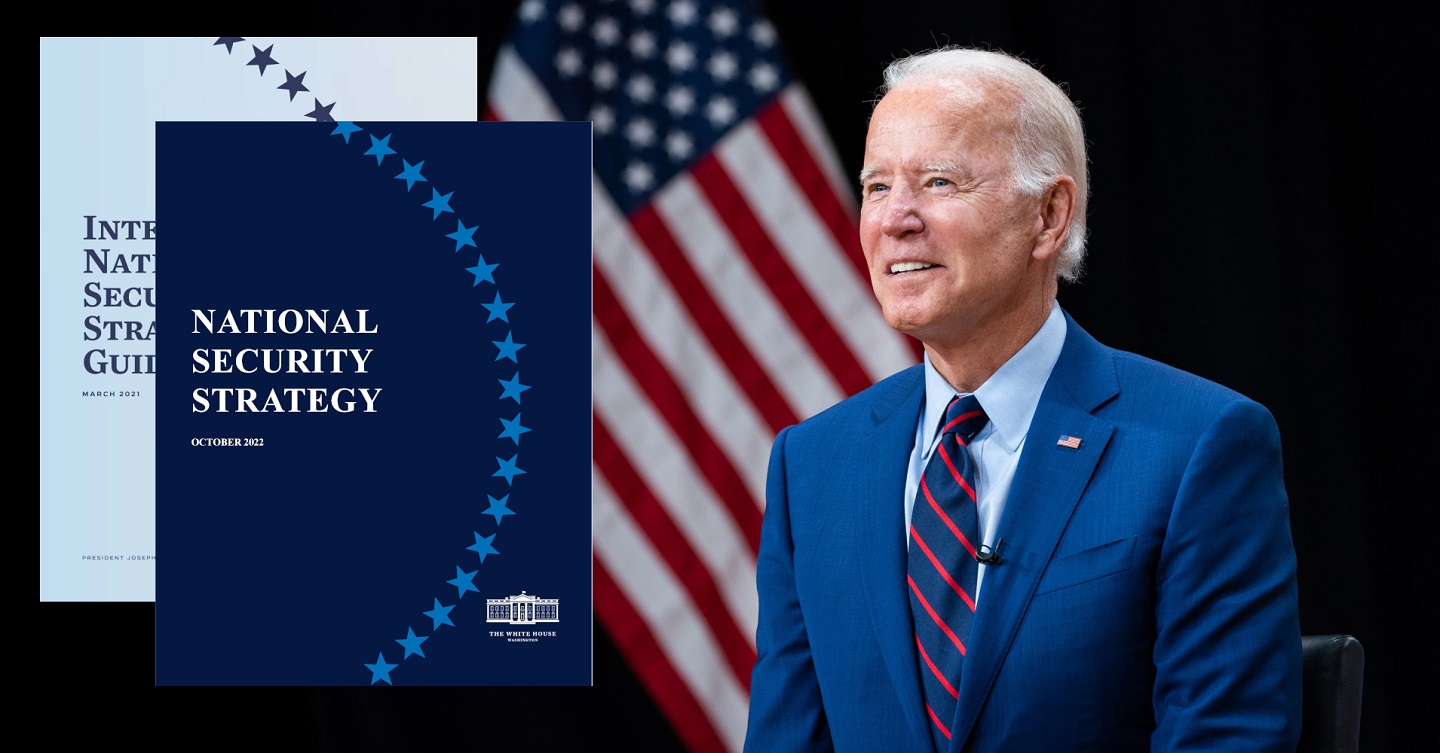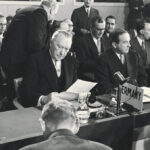
Dating back to 1987 and the Goldwater-Nichols Act, the National Security Strategy (NSS) has become perhaps the most powerful single document to communicate the Executive branch’s vision to Congress, the American people, the many departments of the U.S federal government, as well as foreign friends and foes. When President Biden took office in January 2021, his administration produced an Interim NSS that many nicknamed the “skinny NSS” and released it March of that year. On 12 October 2022, the Biden-Harris administration released an updated NSS. We’ve got Carrie A. Lee and J.P. Clark in the studio to examine the contents of the new document and talk about what has changed, what is emphasized and what the new NSS communicates to the world. They join podcast editor Ron Granieri to highlight the themes and messages in the new product that is now twice as large as the original interim NSS.
So national security strategic documents like the NSS they serve two purposes. The first is as a signaling device both to domestic and international audiences, and then they also provide strategic direction to the rest of the bureaucracy that is the executive branch of government.
Podcast: Download
Subscribe: Apple Podcasts | Spotify | Amazon Music | Android | Pandora | iHeartRadio | Blubrry | Podchaser | Podcast Index | TuneIn | Deezer | Youtube Music | RSS | Subscribe to A Better Peace: The War Room Podcast
Carrie A. Lee is an associate professor at the U.S. Army War College, where she serves as the chair of the Department of National Security and Strategy and co-director of the USAWC Center on Civil-Military Relations. She received her Ph.D. in political science from Stanford University and a B.S. from MIT.
COL J.P. Clark is an Army War College Professor in the Department of Military Strategy, Planning, and Operations, as well as the editor-in-chief of War Room. His previous assignment was in the Pentagon, where he was the chief of the Strategy Division in the Army Staff.
Ron Granieri is an Associate Professor of History at the U.S. Army War College and the Editor of A BETTER PEACE.
Photo Description: The 46th President of the United States Joe Biden
Photo Credit: The White House





The nexus between domestic and foreign policy today, this such nexus is best understood, I believe, through the “cause” (demand for revolutionary change) and “effect” (resistance to revolutionary change) relationship that I describe below. Likewise, the challenges to “democracy at home and democracy abroad” — that we are experiencing currently — these such challenges, also I believe, are best understood from this such perspective — both of which I attempt to describe in greater detail below:
a. CAUSE = Demand for Revolutionary Change Both at Home and Abroad: The U.S./the West, post-Cold War, determined that we should transform both the states and societies of the world generally and the states and societies of the U.S./the West also; this, so that same might be made to better interact with, better provide for and better benefit from such things as capitalism, globalization and the global economy. Such things as our promotion of “diversity, equity and inclusion” for example — both here at home and there abroad — this, I believe, is best seen through this such — “market-related”/”achieve revolutionary change” lens:
“Major American businesses have made clear that the skills needed in today’s increasingly global marketplace can only be developed through exposure to widely diverse people, cultures, ideas, and viewpoints. What is more, high-ranking retired officers and civilian leaders of the United States military assert that, ‘based on their decades of experience’ a ‘highly qualified, racially diverse officer corps … is essential to to the military’s ability to fulfill its principle mission to provide national security. … ”
(Justice Sandra Day O’Connor being quoted here. See beginning at the bottom of Page 698 of the Catholic University of America, Columbus School of Law paper “Moral Communities or a Market State: The Supreme Court’s Vision of the Police Power in the Age of Globalization” by Antonio F. Perez and Robert J. Delahunty.)
b. EFFECT = Resistance to Revolutionary Change Both at Home and Abroad: The more conservative elements of the states and societies of the world — those both here at home and there abroad — rebelled against these “transformative” initiatives. Why? Because, by way of “transformation”/ by way of “revolutionary change,” those wielding power, influence, control, etc., (both here at home and there abroad), these such folks would lose power, influence, control, freedom of action, etc.; this, via these such “transformative” processes.
From this such “common threat” perspective, thus, one can easily see how — for example Russia and certain conservative elements here in the U.S./the West — might come to see each other as (a) “natural allies” having (b) “common cause:”
“Liberal democratic societies have, in the past few decades, undergone a series of revolutionary changes in their social and political life, which are not to the taste of all their citizens. For many of those, who might be called social conservatives, Russia has become a more agreeable society, at least in principle, than those they live in. Communist Westerners used to speak of the Soviet Union as the pioneer society of a brighter future for all. Now, the rightwing nationalists of Europe and North America admire Russia and its leader for cleaving to the past.”
(See “The American Interest” article “The Reality of Russian Soft Power” by John Lloyd and Daria Litinova.)
Bottom Line Question — Based on the Above:
a. Does the new, larger version of President Biden’s National Security Strategy — boldly and in detail — (a) address the nexus between our foreign and domestic policies; this, (b) via the “attempt to achieve revolutionary change both at home and abroad” perspective that I provide above? Likewise:
b. Does the new, larger version of this NSS — boldly and in detail — (a) describe the current challenge to “democracy at home and democracy abroad;” this, (b) via the “resistance to revolutionary change both at home and abroad” lens I provide above?
(If not, then might we suggest that this such NSS might need to be sent back for revision/for reconsideration?)
Another way of looking at certain of the matters that I present above:
If the main problem with U.S./Western foreign and domestic policies is that they are too transformative and, thus, too socially and politically disruptive,
And if our competitors/our opponents/our enemies (those both here at home and there abroad) — recognizing this — have determined that they can easily supplant the U.S./the West/supplant current U.S./Western leadership; this, by offering foreign and domestic policies which are less transformative and, thus, less socially and politically disruptive,
Then does our current NSS — boldly, clearly and in detail — specifically address these such challenges/these such matters?
As another way of determining whether the new, bigger Biden National Security Strategy effectively deals with the more important problems facing the U.S./the West today; as another way of doing this, let us consider this from the perspective of a New/Reverse Cold War.
In the New/Reverse Cold War of today, the U.S./the West, post-the Cold War, became the ones who moved out smartly to pursue “expansionist” goals/to pursue “revolutionary change” objectives both here at home and there abroad — in our case — in the name of such things as market-democracy:
“ ‘The successor to a doctrine of containment must be a strategy of enlargement, enlargement of the world’s free community of market democracies,’ Mr. Lake (then-National Security Advisor to then-President Bill Clinton) said in a speech at the School of Advanced International Studies of the Johns Hopkins University. ”
(Item in parenthesis above is mine. See the September 22, 1993 New York Times article “U.S. Vision of Foreign Policy Reversed” by Thomas L. Friedman.)
Post-the Cold War, the U.S./the West’s competitors/opponents/enemies — thus threatened by our such “expansionist”/our such “achieve revolutionary change both at home and abroad” objectives — moved out smartly themselves; in their case, to (a) formulate and deploy “containment” and “roll back” strategies and to (b) work more “by, with and through” the more conservative elements of the states and societies of the world in this such effort. (This, after all, is what we had taught them in the Old Cold War.)
“In his annual appeal to the Federal Assembly in December 2013, Putin formulated this ‘independent path’ ideology by contrasting Russia’s ‘traditional values’ with the liberal values of the West. He said: ‘We know that there are more and more people in the world who support our position on defending traditional values that have made up the spiritual and moral foundation of civilization in every nation for thousands of years: the values of traditional families, real human life, including religious life, not just material existence but also spirituality, the values of humanism and global diversity.’ ”
(See the Wilson Center publication “Kennan Cable No. 53” and, therein, the article “Russia’s Traditional Values and Domestic Violence,” by Olimpiada Usanova, dated 1 June 2020.)
Bottom Line Question — Based on the Above:
Does the new/larger Biden National Security Strategy describe how the U.S./the West — in the New/Reverse Cold War of today — might “win?”
This, when confronted with competitors/opponents/enemies who — effectively today — have “turned the tables” on the U.S./the West?
Interesting